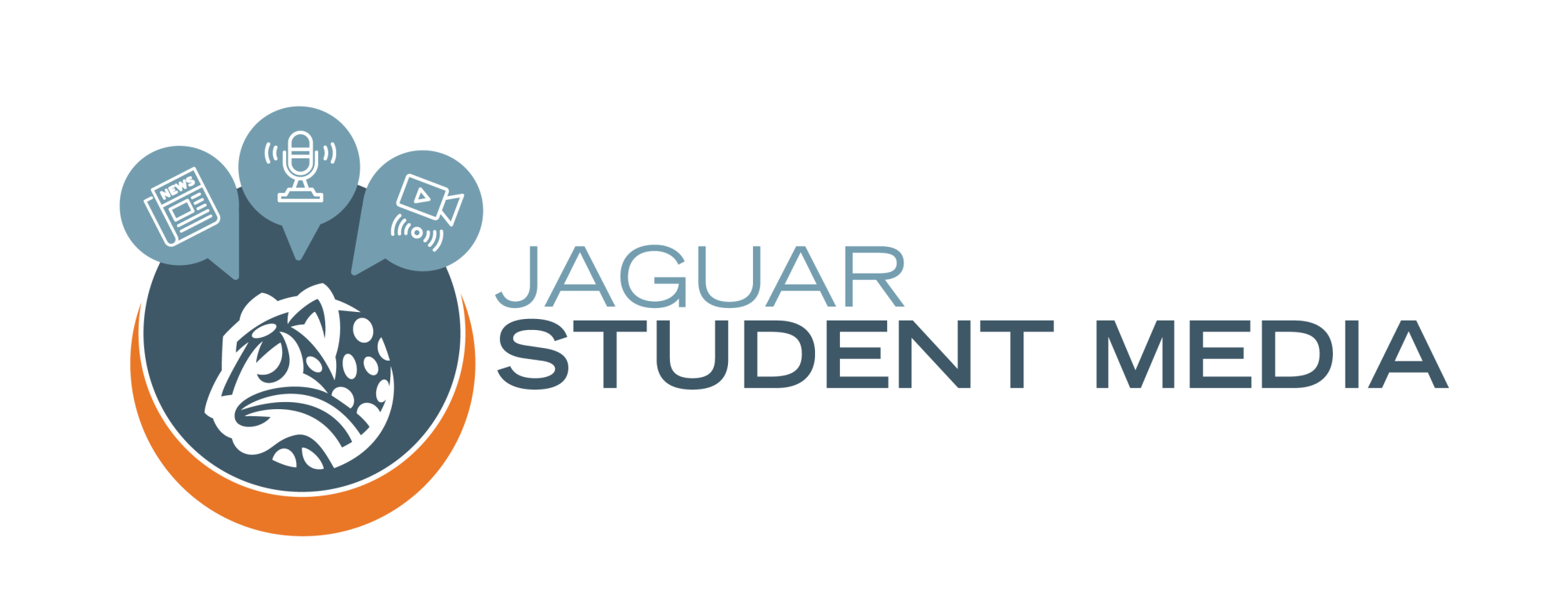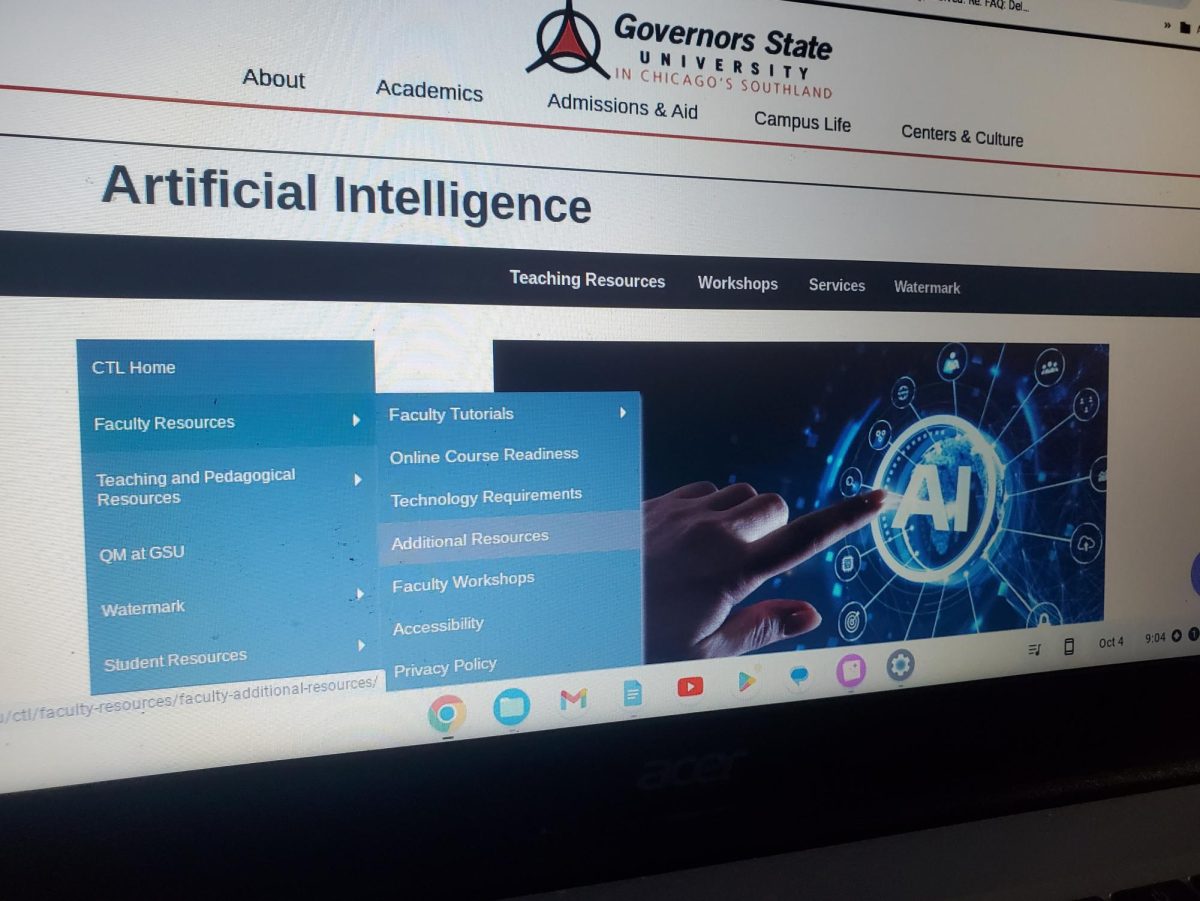By Chris Weber, Phoenix staff writer
Governors State University developed a new artificial intelligence policy over the summer.
Artificial intelligence has grown powerful enough to be mentioned in college syllabi nationwide, and GSU is no exception. Read the statement taken from a Fall 2023 syllabus below:
“At Governors State University, we acknowledge the growing impact of artificial intelligence (AI) on education and strive to create a learning environment that promotes innovation, academic integrity, and responsible use of technology. All students are expected to adhere to the following guidelines regarding the use of AI in the classroom:
1. Responsible AI use: While AI can be a valuable tool for learning, it is essential to use it responsibly and ethically. AI might be used to expand your understanding of course content, not as a substitute for your own work. All work submitted in this course must be your own, completed in accordance with the university’s academic regulations.
2. Academic Integrity: Using AI-generated content as your own work, including but not limited to essays, assignments, and exams, constitutes academic dishonesty. If you would like to use AI, please obtain prior permission from your instructor before using AI to complete an assignment. Any instances of academic dishonesty may be subject to disciplinary action.”
GSU Provost Beverly Schneller explained that the new policy was composed by the Digital Learning Master Plan Committee. The committee originally was formed to evaluate online courses and respond to student needs. They decided to consider AI when the impact of this new technology was realized.
“Working with the deans, we crafted the syllabus statement that was kind of our pilot,” said Schneller. “We weren’t really sure if students were going to experiment with Chat GPT or some of the other tools. Because it is all an emerging moving landscape, we just wanted to get something out there, and then we can figure out where to go from there.”
Schneller said that the committee will continue to monitor AI and how it is used in education. They hope to understand how AI and other virtual tools can serve students by looking at research in the area.
“My hope is to bring some students in once we have something a little bit more concrete to show them,” said Schneller. “Once we have something, then we can take it to the student senate, take it to the campus, and, of course, through the faculty senate and all of the processes. Mainly, we just want to make sure that what we come up with makes sense to the people that want to use it.”
Schneller pointed out that students have been using AI longer than most people realize. Programs like Grammarly can edit grammar, punctuation, and sentence structure. Grad students frequently are encouraged to use these types of editing applications for their writing. AI algorithms also have been disseminating internet content for many years.
But despite recent AI technology advancements, language learning programs like Google Bard or Chat GPT frequently fail to produce factual information.
“It is one of those things that is only as good as what you tell it,” said Schneller. “I have seen people use it like a brainstorming tool. You definitely wouldn’t want to cite it.”
Schneller said that students should not be turning in homework or essays produced by AI programs. “From an academic standpoint, we would have to treat that as plagiarism,” she said. “It would be the same principle as highlighting a text and copying and pasting it from a published article. What the academic honesty policy is really built on is not punishment, but making sure that students learn as communicators how to think critically and express themselves authentically.”
“That syllabus statement is a suggestion,” said Schneller. “We took a very light brush. We’re aware it is out there. We want students to remember academic honesty and ask their professors about it. When you’re teaching media literary and digital literacy, I think you want people to be exposed. You need to look it at it so you can understand how it works.”
Schneller said she hopes we can learn from language models like Chat GPT.
“If it is doing something from an analytical standpoint that we can learn from, then we can look at how they are putting thoughts together. So, if I’m looking at it, I am looking at it to figure out what’s the gap. What’s the flaw? Where’s the growth area? I want somebody here to figure that out and design a program to make it work better,” she said.
Schneller said that her research into AI programs has given her some perspective on where they can be useful. One example she used was “explaining things for patients in a medical setting.”
“If you understand the reading level of your client or patient and you want to figure out how to explain a technical concept to them, you can use it to help you get that framework started,” Schneller said. “That can be very useful.”
“The first example I saw AI do was when a faculty member was telling it to create a syllabus for a course,” said Schneller. “From my standpoint, if you’re a brand new faculty member and you’re trying to figure out how to design a syllabus, it can do that. If it can, let it do it. Then you’re going to learn from it. It doesn’t mean it is the right template, but at least it shows you a direction.”
When asked for a comment about this article, Chat GPT gave the following response:
“It’s heartening to see Governors State University taking proactive steps in addressing the integration of artificial intelligence into education. The guidelines outlined in the syllabus statement strike a balance between embracing technological advancements and upholding academic integrity. Provost Beverly Schneller’s thoughtful approach toward AI’s potential in various educational settings, especially in fields like medicine, is commendable. This demonstrates a commitment to leveraging AI for its strengths while recognizing its limitations. It’s clear that GSU is dedicated to preparing students for a future where technology and learning coexist harmoniously. Looking forward to witnessing how this policy evolves alongside the ever-advancing world of AI.”
As large language models continue to grow in complexity, the university has plans to monitor the progress and update policy as needed. The GSU AI policy and more resources can be found here.

